For a couple of weeks now, we’ve been talking about Flying with Firearms (Part 1 and Part 2) here on TFB. Hopefully, many of you who have yet to try this are now considering it, armed with knowledge and advice to help prevent problems from ruining your travel day.
As many readers know, I try to always keep abreast of the various trends and changes happening at our nation’s airports. Beginning in March of 2017, I and a number of people writing to me started observing something very different when we attempted to pick up our gun cases at Delta Airlines baggage claim areas.
Enter: the Zip Ties of Freedom.
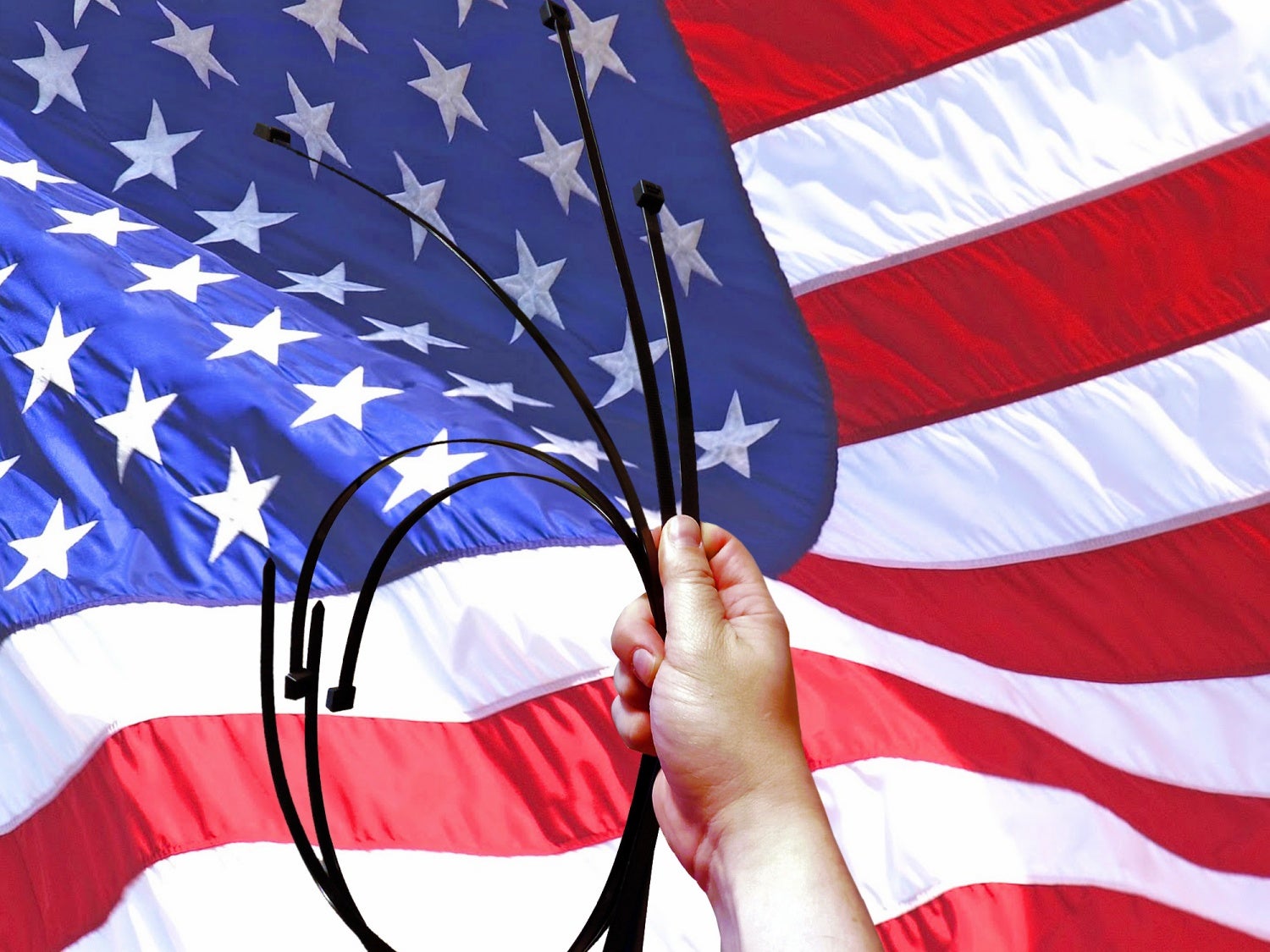
You may have heard about this phenomenon already. I’ve seen it pop up on hunting websites. It was analyzed as possibly illegal by PrinceLaw. It was even part of an interview I did on InRangeTV. For those of you who have yet to experience this in person, it may come as something of a surprise. I know that I was pretty shocked in March this past year when I first encountered this new Delta practice.
When flying with firearms, I had become used to picking up my gun cases in the Baggage Service office at my destination. This has been something of a semi-reliably-enforced policy for a while now with Delta, American, and occasionally other carriers. Very fine print “CAGPT” lettering would appear on my luggage tags, designating that my bags were flagged for “Check and Give Protection To” status in Delta’s back-end software. When throwers and rampers haul luggage from the aircraft, typically their scanners would alert them to this condition and my luggage would be sent to the Baggage Service Office. This would occasionally result in brief delays at some airports (often the bulk of the conventional luggage would be tossed on to bag carousels, then after that was complete someone would then cart the CAGPT items to their waiting owners) but I usually didn’t mind. As alluded to in an earlier article in this series, I valued the extra care being given to my Pelican cases. Even if I was slow getting down to the claim area, no one would have the opportunity to attempt to abscond with them.
NOTE – This is something which has happened personally to me when I was living back east. Upon arrival at PHL International on a United flight home from Honolulu in July of 2013, my girlfriend at the time noticed a shady character loitering in the baggage claim hall. When the carousel started moving and one of my Pelican cases appeared on it, this fellow started to pick it up as if it were his own. We intervened, and he played the part of the “confused older gentleman” effectively enough that we didn’t cause a scene right there… but my girlfriend did covertly photograph the man taking some other luggage while I went to find either someone from United Airlines or someone from the PPD Airport Unit. Showing them photos on my phone and describing what happened sent the officers into overdrive, and they discovered him moments later hiding in a restroom with two bags that belonged to other travelers, an iPhone that belonged to an airport employee, and no convincing excuses as to why this might be. I picked him out of a photo array a few days later and the detective working the case told us that all possessions were returned to their rightful owners. So, a happy ending there.
In March, as was my routine at this point, I walked right past the bag carousels in Orlando and approached the counter of the Delta Baggage Services Office. “Oh, yes sir,” responded the man there, “I can have them ready for you in just a second.” Everything seemed as customary as ever, but I naturally was snapped out of my typical distracted idling on Twitter when I heard the unmistakable ratcheting sound of zip ties being applied. I looked up from my phone and expressed surprise over the fact that said zip ties were being strapped around my own luggage.
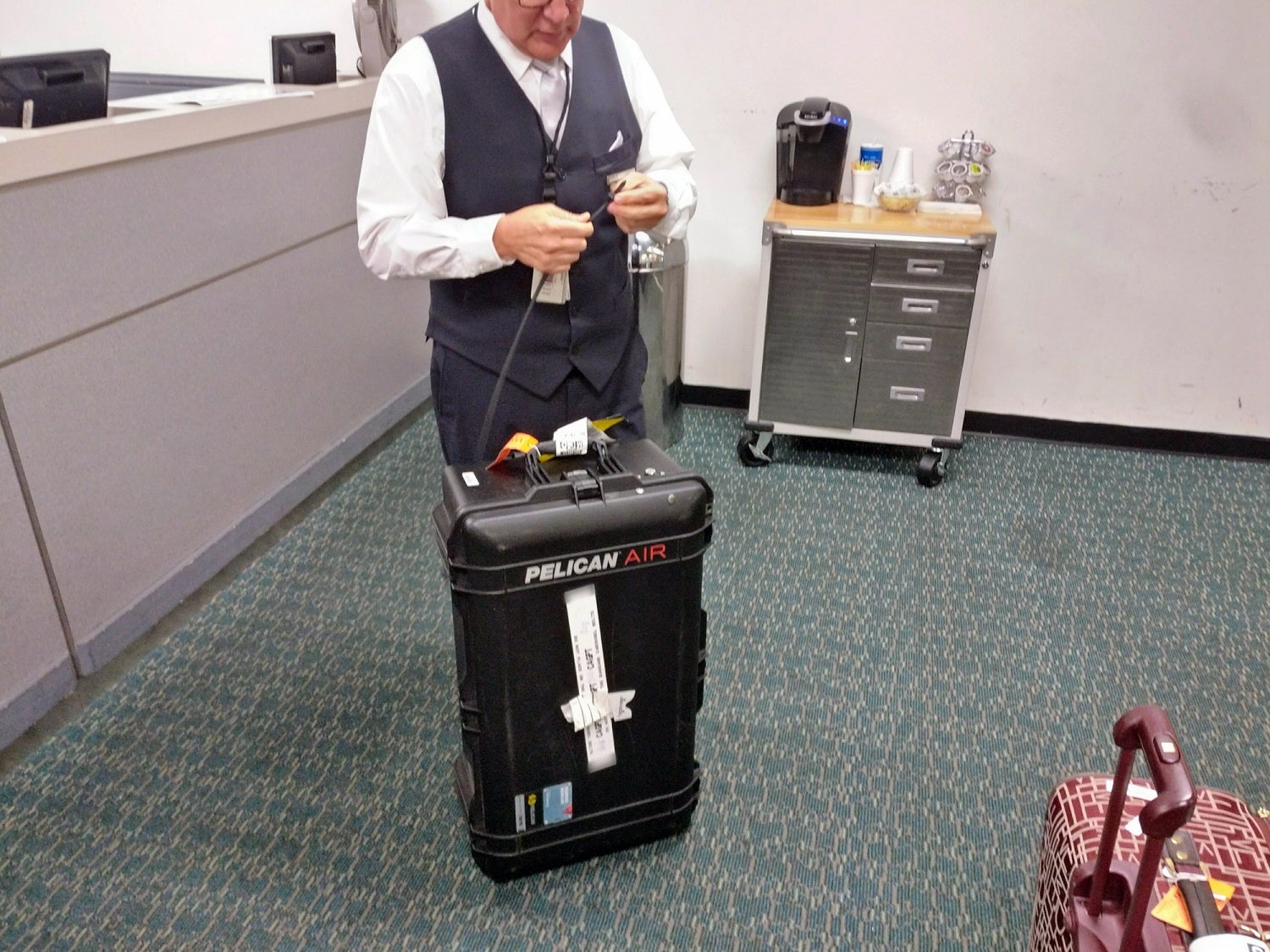
After over a decade with guns in his suitcases, this author had become something of a veteran flier with firearms. He was, therefore, caught completely by surprise when a Delta employee told him that they were obligated to apply zip ties to his Pelican case before returning it.

When inquiring what this was all about, this author was told that his luggage would have to be “locked” before Delta surrendered it. When it was pointed out that the luggage, being a gun case, was already locked (you can’t see in this photo, but the author and some locksmith associates were experimenting with integrating locks directly into the Pelican case itself) the Delta BSO employee merely shrugged and said he had to follow the new directive.
Apparently, this policy was devised rapidly (and with little research) in response to the Fort Lauderdale Airport shooting rampage which occurred back in January of 2017. Fearing public relations ramifications, and wanting to be seen as “doing something” about the fact that citizens in a free country are allowed to fly with their firearms, someone in a Delta office came up with this scheme. Let me be the first to assure you, it is almost universally hated by the front-line Delta employees. In the initial couple months after its roll-out, I joined in with countless airline workers who mocked, complained about, and openly defied this new directive.
The following are all direct quotes from Delta Airlines staff members since the creation of this policy:
“It’s completely pointless, obviously. If only they had spoken to someone who actually worked in an airport before they created that. People can just cut the zip ties off.”
– Seattle, March 2017
“All the passengers hate it.”
– Austin, March 2017
“Isn’t it stupid?”
– Austin, March 2017
“I heard they might be getting rid of this policy. God, I hope so.”
– Minneapolis, May 2017
“This was clearly made up by someone in an office and it doesn’t do anything.”
– Raleigh, May 2017
[Eyeroll and heavy sigh] “Everyone hates these zip ties.”
– Philadelphia, June 2017
The tendency of nearly all involved to mock the use of zip ties to “lock” customers’ luggage is understandable for two reasons. Firstly, luggage containing firearms is already locked. It has to be, of course, as per federal regulation. Secondly, and more obviously, zip ties are wildly ineffective for this purpose. I have seen not only large, hard-sided cases afforded this treatment, but also soft-sided rolling bags and even the duffel bags of US service members.
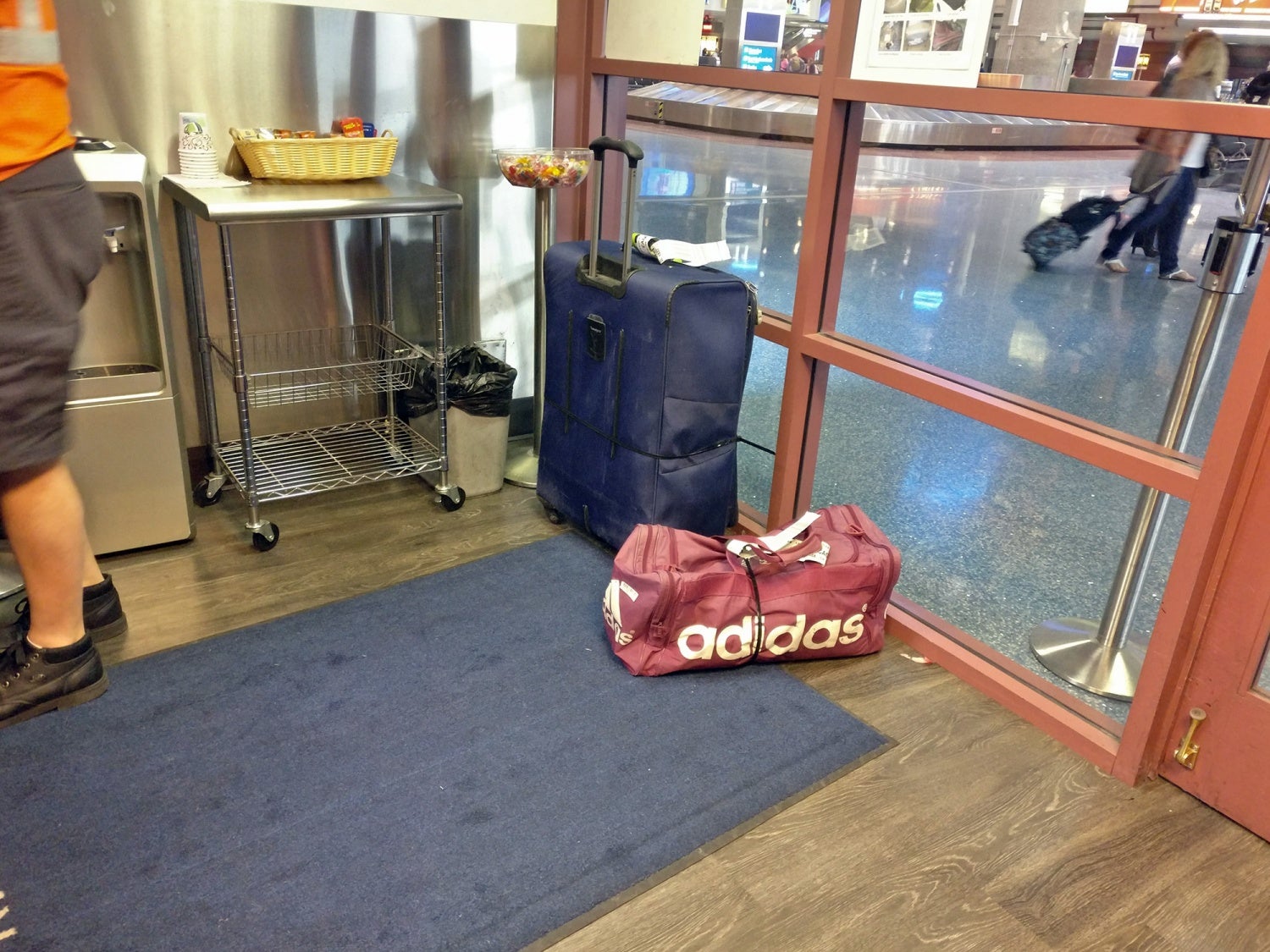
Soft-sided luggage with zip ties lackadaisically looped around them… for safety.

A zip tie has been applied to this Lieutenant’s bag to ensure that no one may gain access to the firearm within. The zip tie is clearly doing a very effective job at this, as you can see by its careful placement.
Given that I have no desire to walk out of an airport with a piece of luggage that clearly distinguishes me as someone transporting firearms (firearms which I ostensibly have no way of easily accessing at that moment, should they be urgently required) I naturally don’t care to keep the zip ties affixed. The very first time I encountered them, I opted to produce a handcuff shim from my wallet and immediately slip them off of my Pelican case. For a while, this became my routine at airports, and I developed quite a collection of free zip ties in the process.
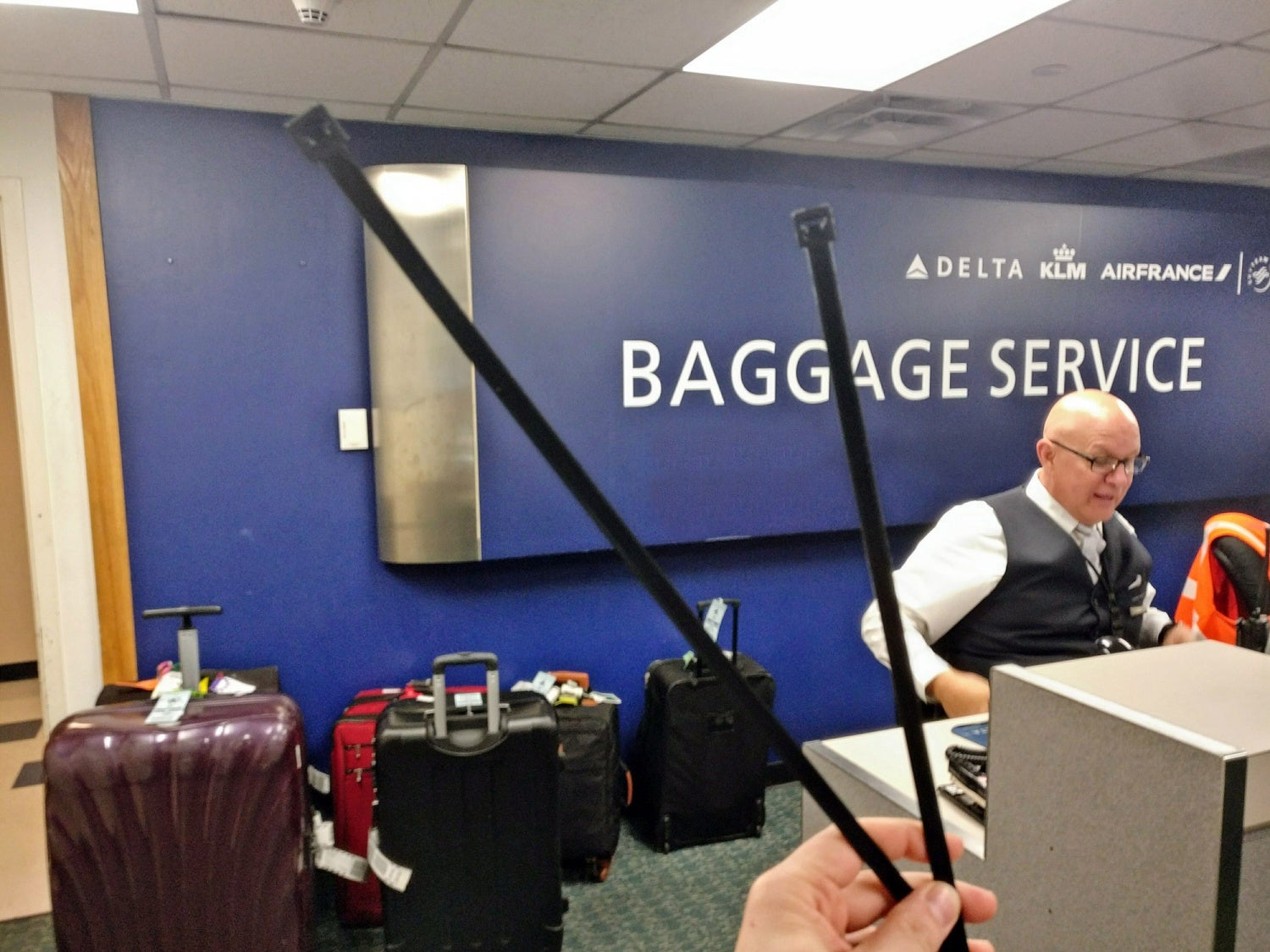
Seconds after the Orlando airport staff applied zip ties to his cases the first time, this author opted to remove them.

The collection of reclaimed zip ties in the author’s travel bag after the first two weeks of this new Delta policy.
Shimming these zip ties started to outlive its usefulness for me after about the 20th time. There were only so many times I could encourage folk to attempt zip tie escapes before the joke became old. At some point, with the bottom of my luggage literally lined with more spare zip ties than I could ever need, I simply started cutting them off and throwing them away. I have a medkit and trauma shears in the webbing of my carry-on backpack (The TSA has repeatedly and publicly confirmed that medical shears are allowed through passenger screening if they have a blade under 4” in length from fulcrum to tip) and it is far more expedient to simply snip the zip ties as soon as they are applied.

The author’s travel bag contains medical shears at all times.

Zip ties have been applied by the Delta staff in the BSO.
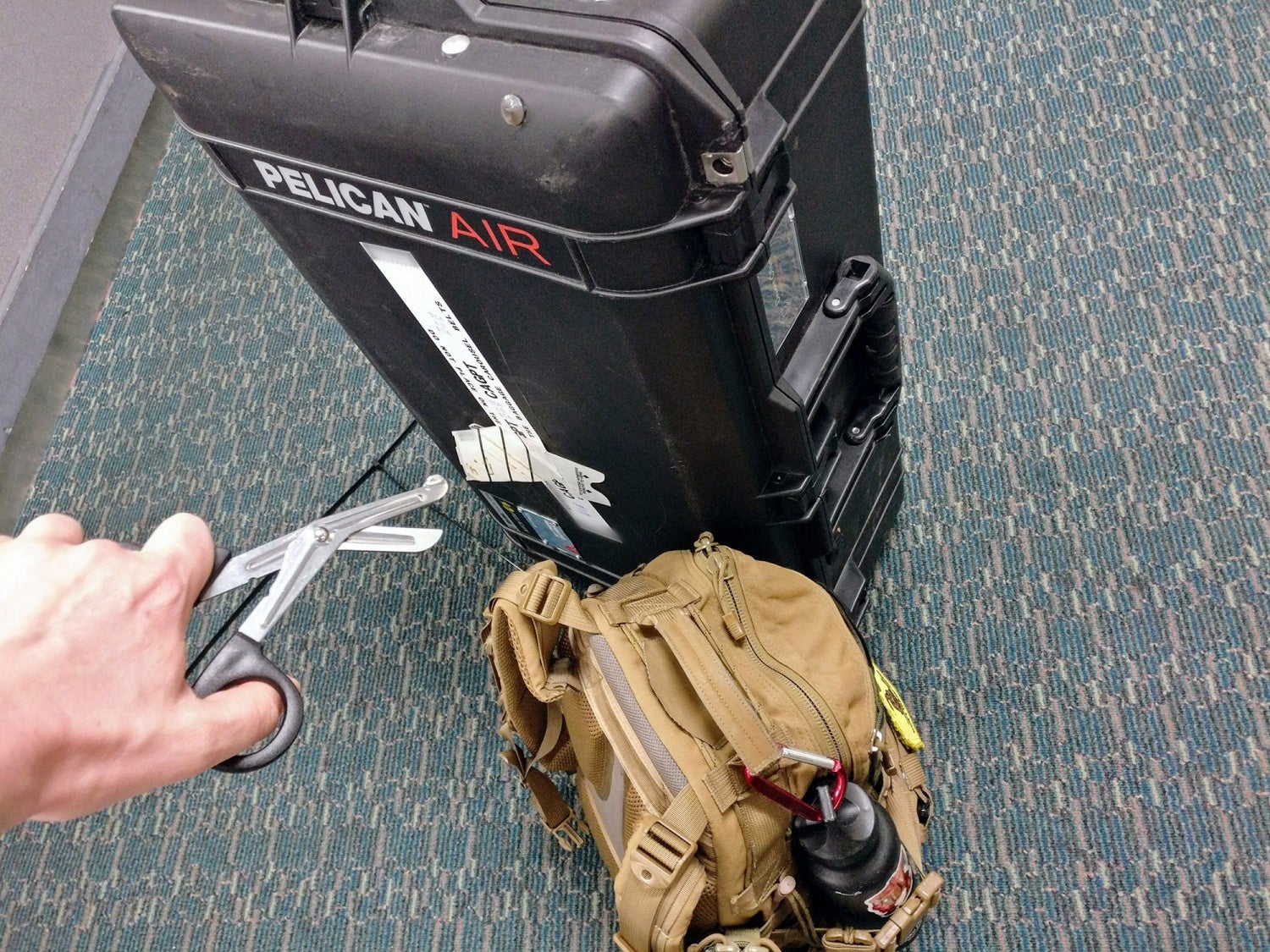
Zip ties have been removed in front of the amused Delta staff in the BSO.

The author and his wife were both flying with firearms this day. Moments after the Delta staff applied the zip ties, they were removed. Everyone had a good laugh about it.

The author and his team were flying with multiple Pelican cases containing guns. As had become the norm by this point, everyone pulled out shears or scissors and cut their zip ties as soon as they were applied by the Delta staff.
Within the first couple months of this new Delta Airlines policy, the employees became visibly disaffected with the whole process, to the degree that they would regularly ignore it. On multiple occasions across a wide range of airports, my team and I would have Delta BSO staff check our IDs to properly verify we were the owners of the firearms and then either give us a friendly wave goodbye or ask half-heartedly, “Do you want to go through the whole song-and-dance with the zip ties?”
In other instances, airline staff would register their displeasure or disinterest by applying zip ties in the most cursory way possible. As the following images showcase, many times I have had a single, small zip tie simply looped through one eyelet of a hasp on my Pelican cases.

The author and his wife found their luggage “locked” by Delta by means of a single zip tie laced through one of the locking hasps on each Pelican case.

Here, airline staff has opted to “lock” a long Pelican model 1750 rifle case using a single light-duty zip tie through the far left side hasp eyelet.

When proceeding to the BSO to pick up his gun case, the author at first thought that no zip ties had been applied at all (something that has become a frequent occurrence at many airports) but upon closer inspection, one was visible.
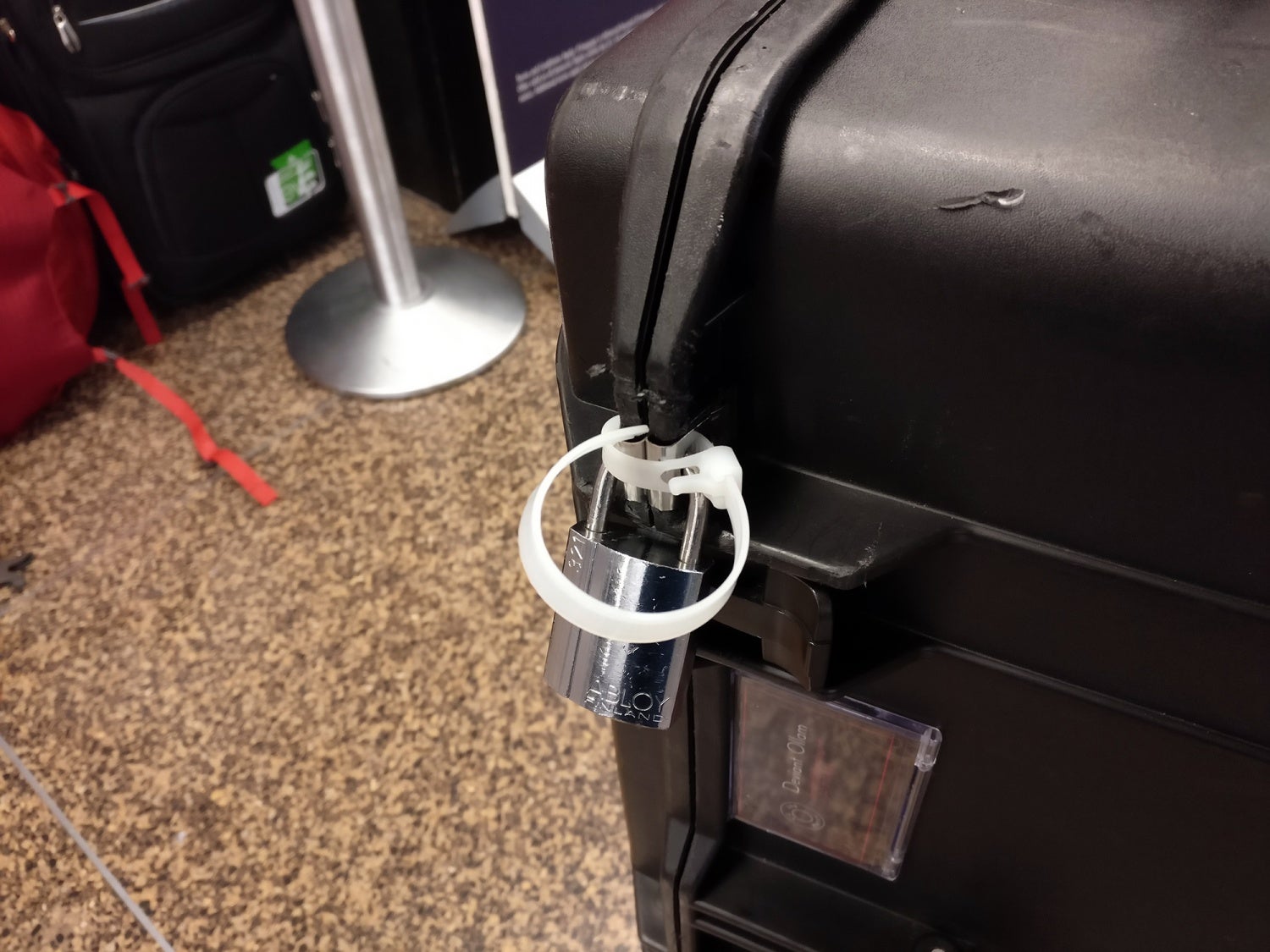
A single zip tie, looped through only one of this cases locking hasps, has been affixed so as to simply comply with Delta policy in the most superficial manner possible.

A quick-release zip tie has been applied to this gun case, negating the need for shimming or cutting.
There’s nothing like hard statistics to illustrate a point. I have been on 66 flights with firearms in 2017 since the rollout of this new Delta policy in March. Upon arrival at my destination, BSO staff applied zip ties only 66.6% of the time (this figure includes laughably small or defiantly-applied zip ties like the ones shown above). The other 33.3% of the time, my luggage was not “locked” upon delivery to me… unless, of course, you count the fact that genuine padlocks were affixed to my gun cases for the entirety of the journey and were still present on my bags upon arrival. Of the times when Delta airline staff did opt to apply zip ties to our luggage, we shimmed or cut them off on all but two occasions while standing right there in full view of BSO staff and (frequently) airport police officers.
To be as complete and accurate as possible in describing this situation, I must mention that a handful of airline staff members appeared to take this new policy very seriously. Erroneously thinking that the zip ties were making people safer or that removal of them constituted a violation of the law, on three occasions verbal resistance was expressed when I produced my medical shears. One man in South Dakota said, “You aren’t supposed to do that, sir,” while I diligently ignored him. One woman at Sea-Tac was upset at how easily my wife and I removed the very tiny zip ties she had applied, but this staff member was interrupted by a colleague who stated, “Oh, we know them… they’re fine. They fly through here all the time.” And, lastly, one BSO staffer in San Diego became aghast and abruptly exclaimed, “I have to call the cops because you just did that!” when I removed the zip tie from my still-locked Pelican case. No police appeared to respond to her report if she ever even made one. This is understandable, given that no crime had taken place… the guns were still locked and unloaded.
Am I perhaps being too hard on Delta Airlines? I feel sympathy over the immense public relations pressure that a company can experience and their desire to be seen as “doing something” in the face of terrorism and threats to public safety. Despite how misunderstood such risks actually are, society’s reaction to violence at our nation’s airports is swift and often highly condemnatory in the media. So I genuinely understand their motivation for wanting to be seen as proactive, even if their efforts are all wildly misspent.
I think that those of us who fly with firearms wouldn’t be as upset about this new policy if it weren’t visibly taking time and effort away from the sorts of things which would genuinely reduce the risk of guns falling into the wrong hands. After all, every dollar and policy placard and training session that Delta has dedicated to this inane effort represents resources and employee education that they are not putting toward ensuring that firearms aren’t mishandled or stolen.
Let us turn again to the statistics my associates and I have gathered since the Zip Ties of Freedom first appeared. Despite the extra-large (and possibly illegal) CAGPT tags applied to our firearms cases (almost) all of the time in 2017, only on 74% of trips was our luggage singled out for retrieval at the Baggage Service Office. 28% of the time, one or more gun cases appeared on conventional, unattended bag belts in the claim hall. NOTE – these percentages appear imperfect because of certain trips when results were mixed, with some gun cases going to the BSO while others popped out on the carousel.

The oversize CAGPT tags on firearm-bearing bags are unmistakable, and they are supposed to result in such luggage not being sent to the usual claim belts.

The author’s wife’s gun case appears on a regular baggage carousel.
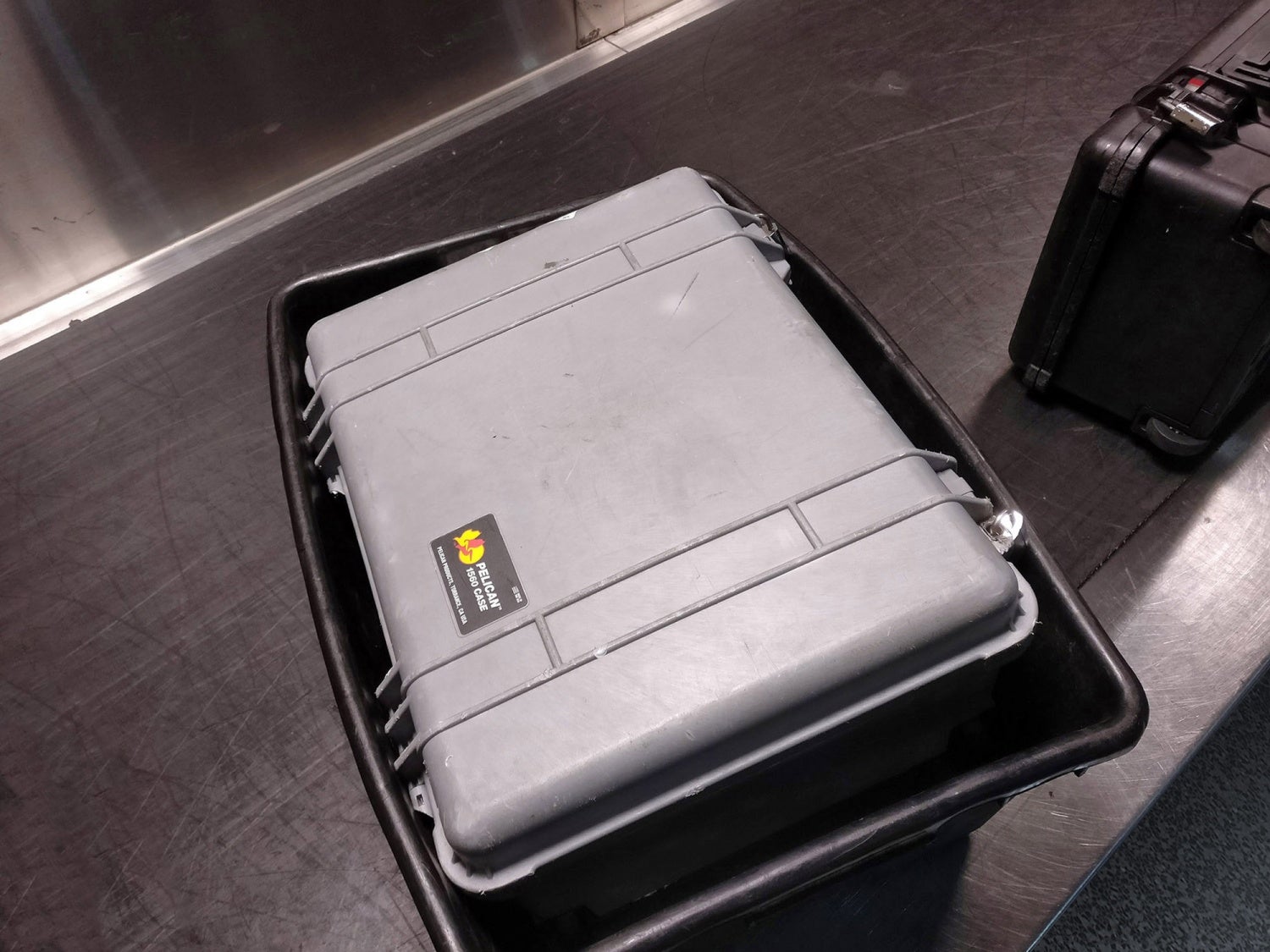
The author’s Pelican case and his business partner’s case, both of which contained firearms, appear on a conventional baggage belt.

After waiting in the Baggage Service Office for nearly 20 minutes while staff assured everyone that firearms “are never sent out to the main claim area” it was eventually discovered that all of this entire party’s gun cases were sitting out in the open on an “oversize” luggage belt in an unoccupied corner of the Delta claim hall.
I truly hope that Delta Airlines considers the input from many of their customers and abandons the Zip Ties of Freedom in 2018. I also hope that rumors I heard of “a considered ban on all ammunition in checked luggage” were just that: rumors with no truth to them. If you are a passenger, I would urge you to make your voice heard. Call customer care departments, fill out feedback forms on airline websites, or write letters to airline offices. If how you are treated when flying with firearms would motivate you to vote with your dollars and book travel on one carrier over another, then that’s something they should hear about from you directly. We are fortunate in the United States to be afforded a diverse marketplace of competing companies who want to earn our business. We are not forced to book our air travel on a single state-owned monopoly carrier. Still, these market forces only serve us if the companies soliciting our business are adequately aware of what priorities we all have.
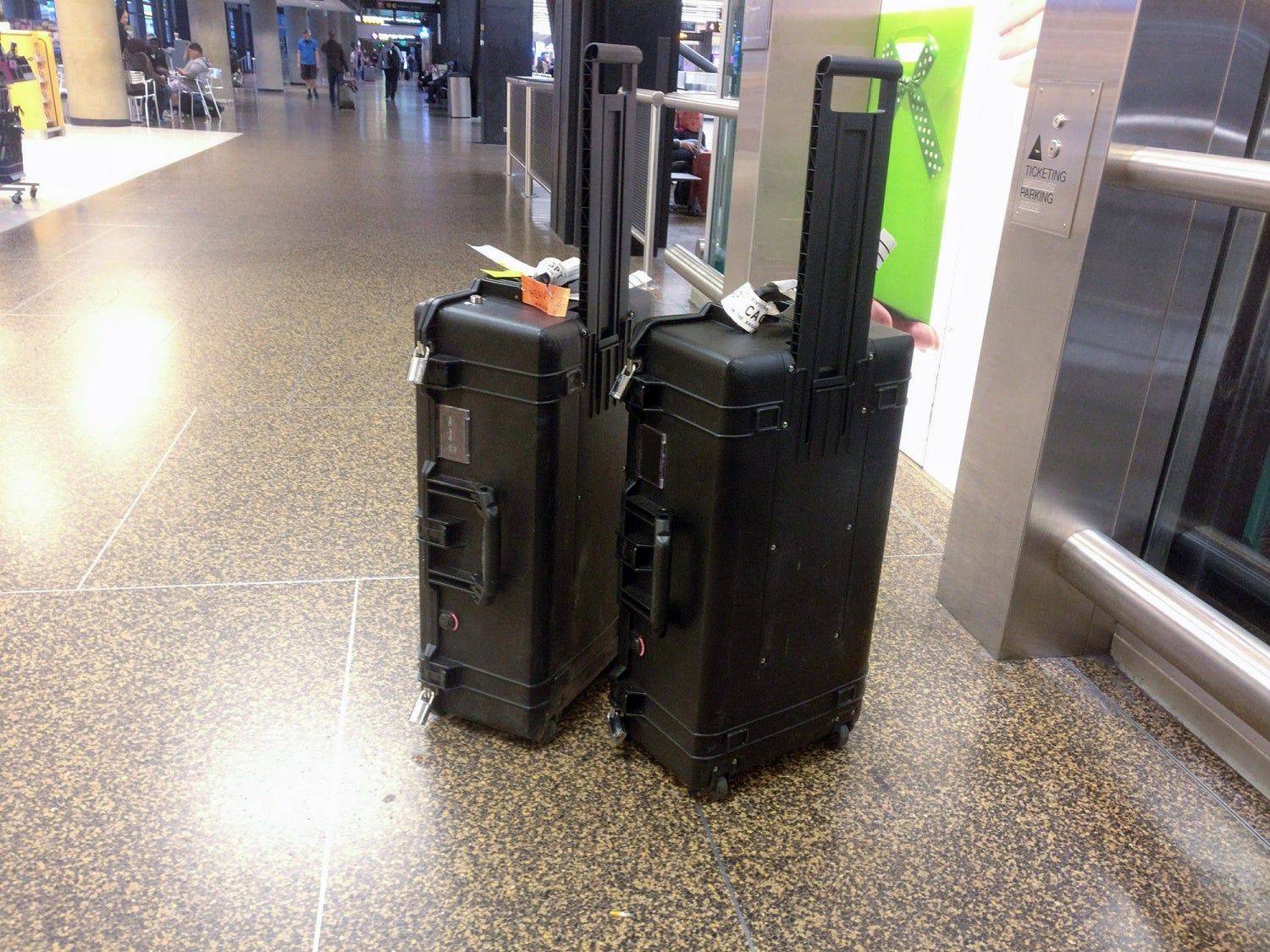
I plan to keep flying with my firearms and to continue blogging and writing about how it goes in 2018 and beyond. If you have an experience of packing in the friendly skies that you’d like to share with me, I’d love to hear from you. Send me an email with details of how you were treated on your journey and I’ll add it to the published accounts page.
I wish all of you a safe and happy New Year and a lifetime of rewarding travel and fun shooting, wherever your journey takes you.
 Your Privacy Choices
Your Privacy Choices
